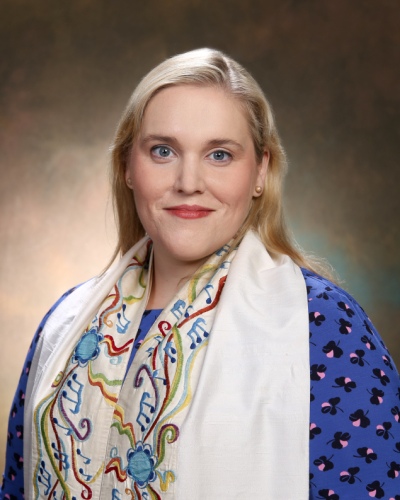When I was about 16, I had the opportunity to spend a few days doing peer leadership training through the National Conference of Christians and Jews. I went to camp – Anytown USA – along with a number of kids from my high school, including some very close friends. We spent several days at Anytown with teens from other cities around New Jersey learning about one another and learning strategies for finding common ground, despite our differences.
In one of the opening activities, I remember sitting on a porch in a circle of chairs with about ten other teens. We were going around giving basic getting to know you speeches. I remember clearly talking about how much pride I took in being from a strong Zionist home, who cared deeply for the State of Israel, and how much my grandfather’s love of Israel strengthened my own sense of Jewish identity.
Sitting next to me was a boy named Mohammed. As I finished my sharing – smiling, I remember – and filled with a sense of love for my People and my Land, Mohammed said, “My name is Mohammed and I am Palestinian. My grandparents fled their homes in fear for their lives, as they ran from Israelis. That is how my family came to the United States.”
It was as if someone punched me in the stomach. I felt sick and confused. I wondered how he felt as he listened to me talk about my own grandfather’s Zionist passion to see the State of Israel thrive and grow. I wondered if I had made him uncomfortable or nauseous as I was in that moment.
This was a watershed moment in my personal development. I learned in an instant that my world was small and that each individual would bring to bear their experiences and their own story on the way that they see the world. I learned that it was best to listen, to contract, to be mindful and open to others. I learned that while we share our own truths, we must always be open to hearing the truth of the other and navigating the space between.
I had the honor to vision and chair the 40th Annual Interfaith Citywide Thanksgiving Service, hosted by MeckMin, this year. Our team spent about five months working to create a worship experience that would give us space to honor the wilderness we are experiencing right now in our world: Paris, Beirut, Charleston, and so many more places torn apart by hate and fear – and move us toward hope that we have the power to move the world closer and closer towards sh’leimut – wholeness.
40 years ago, the first Interfaith Thanksgiving service in Charlotte was convened by Temple Beth El and the Unitarian Universalist Church of Charlotte. In the spirit of the history of the service on this auspicious anniversary, Rabbi Schindler and Reverend Leach from the UUCC gave a Call to Action at the conclusion of Tuesday’s service. Here are their words:
Reverend Leach; Forty years ago, my predecessor, Rev. Dr. Sidney Freeman was the minister of the Unitarian Universalist Church of Charlotte.
Rabbi Schindler: My predecessor, Rabbi Harold Krantzler had arrived in town as the new rabbi of Temple Beth El.
Reverend Leach: Rabbi Krantzler called Rev. Freeman to ask when Charlotte’s Interfaith Thanksgiving Service would be held.
Rabbi Schindler: And he heard from Rev. Freeman that there was no Interfaith Thanksgiving in the Charlotte of 1975. So, the two leaders decided to begin this tradition. And theirs were the voices our city heard when we first gathered in a service of giving thanks that was inclusive of Charlotte’s religious pluralism of that time.
Reverend Leach: From a single phone conversation between a Unitarian Universalist and a Reform Jew now four decades in our past, look at us now, gathered here embodying the beautiful tapestry that is Charlotte’s religious community.
Rabbi Schindler: Tonight we celebrate forty great years of coming together as neighbors across lines that too often divide us and create division within the human family.
Reverend Leach: This is not just about celebrating together, coming together for one night a year. This is also about being inspired to live out our gratitude in ways that help transform our community.
Rabbi Schindler: It is about living with thanks – with gratitude for all that we have.
Reverend Leach: And, it is about living by giving – sharing the abundance we know with those around us and with those who are in need.
Rabbi Schindler: So, along with our celebration of forty great years we also celebrate four great organizations that sustain our community – Crisis Assistance, Loaves and Fishes, Charlotte Family Housing, and Freedom School.
Reverend Leach: Each organization supports those who are struggling with critical and core needs – food, housing, education, assistance and advocacy.
Rabbi Schindler: During the reception representatives from these four beloved Charlotte organizations will be staffing tables. As you think about offering thanks and giving, we hope you will approach these representatives to learn more about their work and about how you might offer support for and be involved in their transformative efforts.
Reverend Leach: May our prayers together tonight lead us to work ever more closely tomorrow and in the days that lie ahead, building ever more deeply on the legacy of these past forty years.
Rabbi Schindler: Thank you, Rev. Dr. Sidney Freeman.
Reverend Leach: Thank you, Rabbi Harold Krantzler.
Rabbi Schindler: Thanks to each of you for your presence. Together may we go from this place to create the beloved community for which our beloved predecessors dreamed and to which each of our traditions points us.
May we listen, share, dream, and give thanks for the ability to build the world we long to see.




